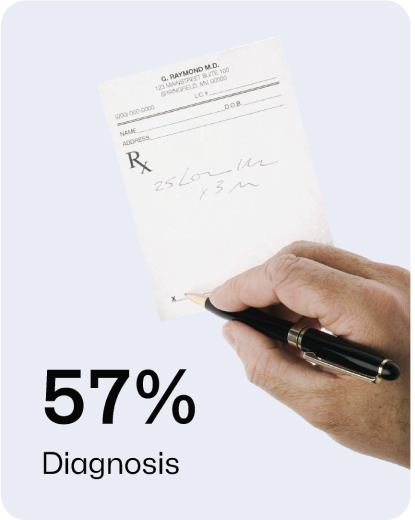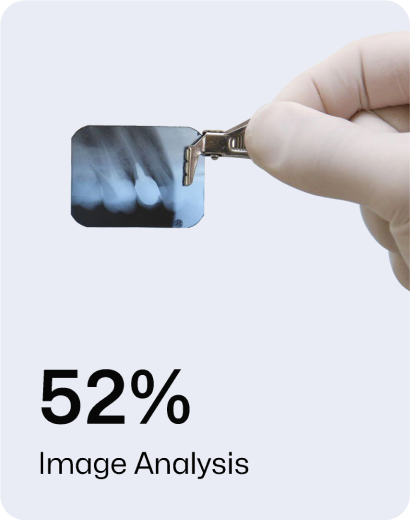AI IN DENTISTRY SURVEY
Perceptions, Insights, and Possibilities
In recent years, the dental industry has experienced incredible advancements and rapid growth with the integration of cutting-edge technologies, specifically artificial intelligence (AI) in dentistry. However, the implementation of this hybrid computer-human intelligence has generated mixed reactions among stakeholders in the dental landscape.
While some have embraced AI and its potential, others remain skeptical of its impact on the industry. So which opinions bear more weight? Is Dentistry thriving or declining on account of artificial intelligence?
This report provides a concise summary of an AI in dentistry survey. It sheds light on how AI is transforming dentistry and impacting patient care. Using practitioner perspectives from 250 licensed dentists in the U.S. and insights from 1015 surveyed patients, let us delve into the ins and outs of artificial intelligence in the dentistry industry.
Survey
Methodology
In order to compile the survey, information was collected from 1015 patients and 250 experienced dentists in the United States in July 2023. All patients were required to have visited the dentist at least once within the past two years. Any responses that did not meet the qualifications were excluded from our findings.
Key
Findings
-
35%
of surveyed dentists have implemented AI in their dental practice.
-
77%
of surveyed dentists observed positive outcomes in their practice since implementing AI.
-
81%
of dentists have a positive attitude towards AI applications in dentistry.
-
62%
of surveyed dentists agreed that some of the operational tasks in dental clinics could be performed by AI.
-
57%
believe that AI could replace certain tasks currently performed by dentists.
-
55%
of dentists believe that the advancements in AI could result in potential layoffs in the dental care industry in the next five years.
-
68%
of the patients believe in the potential benefits of AI applications.
-
65%
of surveyed patients are open to receiving dental treatment or diagnosis that incorporates AI in the future.
-
42%
of the surveyed patients feel comfortable receiving AI-based dental treatment, while the majority remain neutral about this matter.
-
72%
According to 72% of patients, the "lack of human interaction during treatment" is their primary concern regarding integrating AI in dentistry.
-
10%
Only 10% of surveyed patients are willing to pay extra for dental treatment or diagnosis that incorporates AI technologies.

Dentist Insights
The first part of the survey focused on practitioner insights by studying five key sections.
First, the survey analyzed the demographics of the dentists interviewed. The next section establishes the extent of practitioner acceptance and incorporation of AI into their practice. Further sections analyze dentistry practitioners' perceived benefits, concerns, and opinions about the future of artificial intelligence in the field.
Let's explore the details in each section.

Demographic
Of the 250 dentists interviewed, 66% were female practitioners. The next 33% were males, and only 1% identified neither as male nor female.
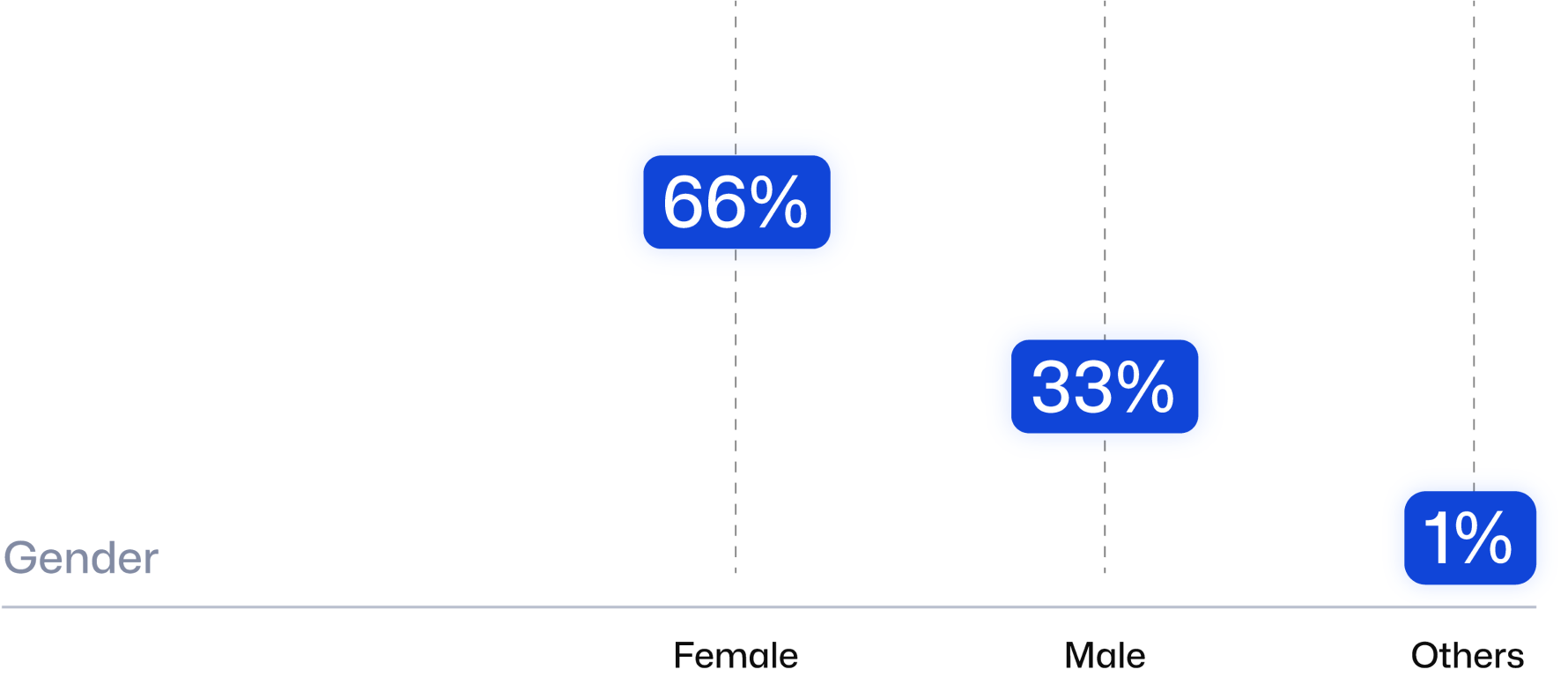
AI Acceptance
in Dentistry
of surveyed dentists have implemented AI in their dental practice.
These respondents find AI valuable for enhancing their clinical practice, streamlining workflow, and improving patient outcomes. Additionally, these early adapters highlighted the areas of their dental practice where they had incorporated AI.
Here's a breakdown of the areas where artificial intelligence is implemented in their dental practice and the percentage of practitioners that have leveraged AI in that area.
Areas where AI is implemented in their dental practice
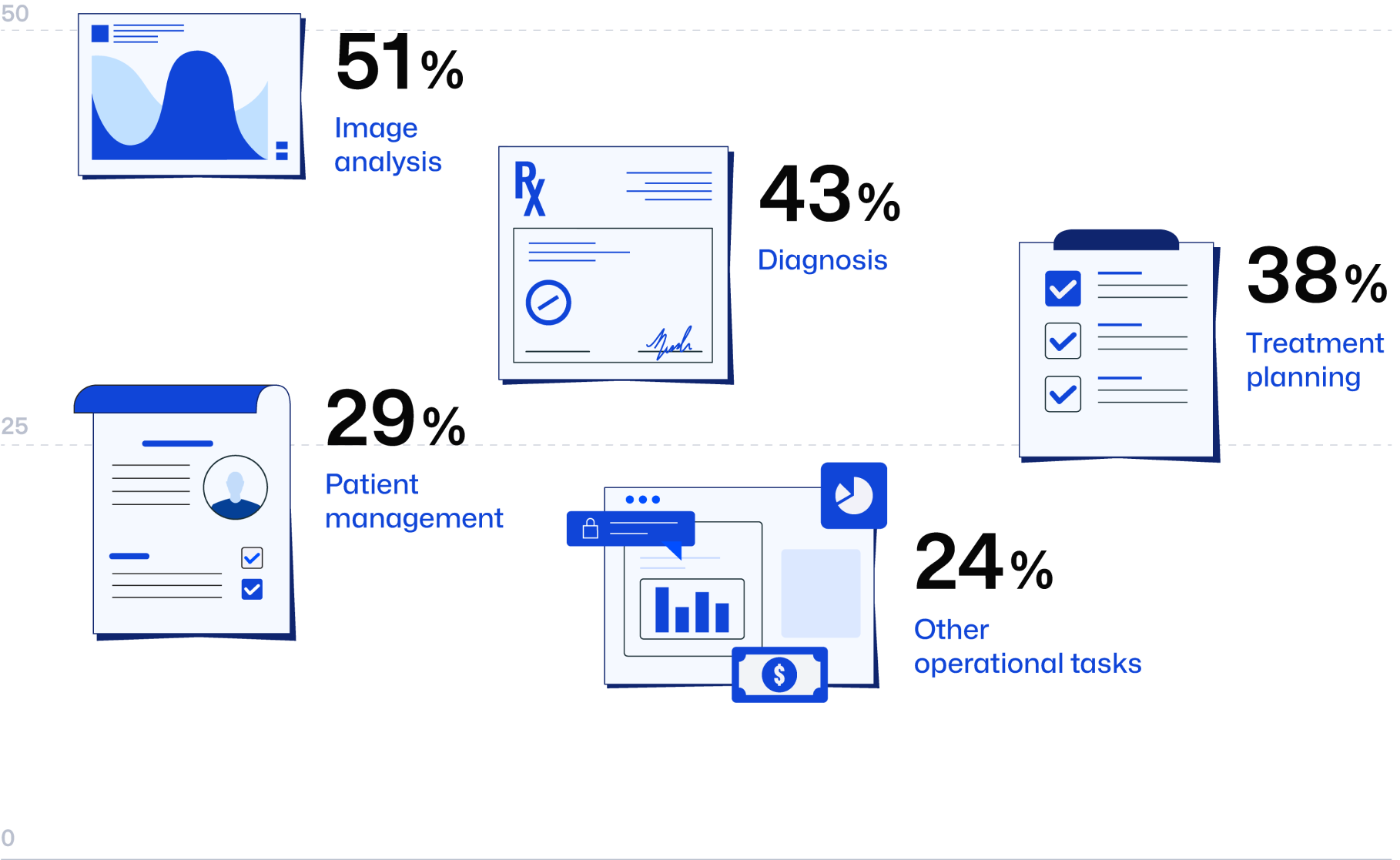
AI Benefits
in Dentistry
As the number of dentists in the survey incorporating AI into their practice grows, there is a corresponding increase in advantages related to the technology.
of surveyed dentists observed positive outcomes in their practice since implementing AI.
The dentists citing improvements post-AI incorporation emphasize the efficiency that comes with the technology. AI makes it easier to analyze patient medical records and tailor personalized treatment. Scheduling and consultations also get easier with virtual assistants and chatbots,and service delivery drastically improves.
Specifically, practitioners list the following five areas as the top-ranking benefits of implementing AI in dentistry.
As a result of these benefits
of dentists have a positive attitude towards AI applications in dentistry.
Benefits of implementing AI in dentistry
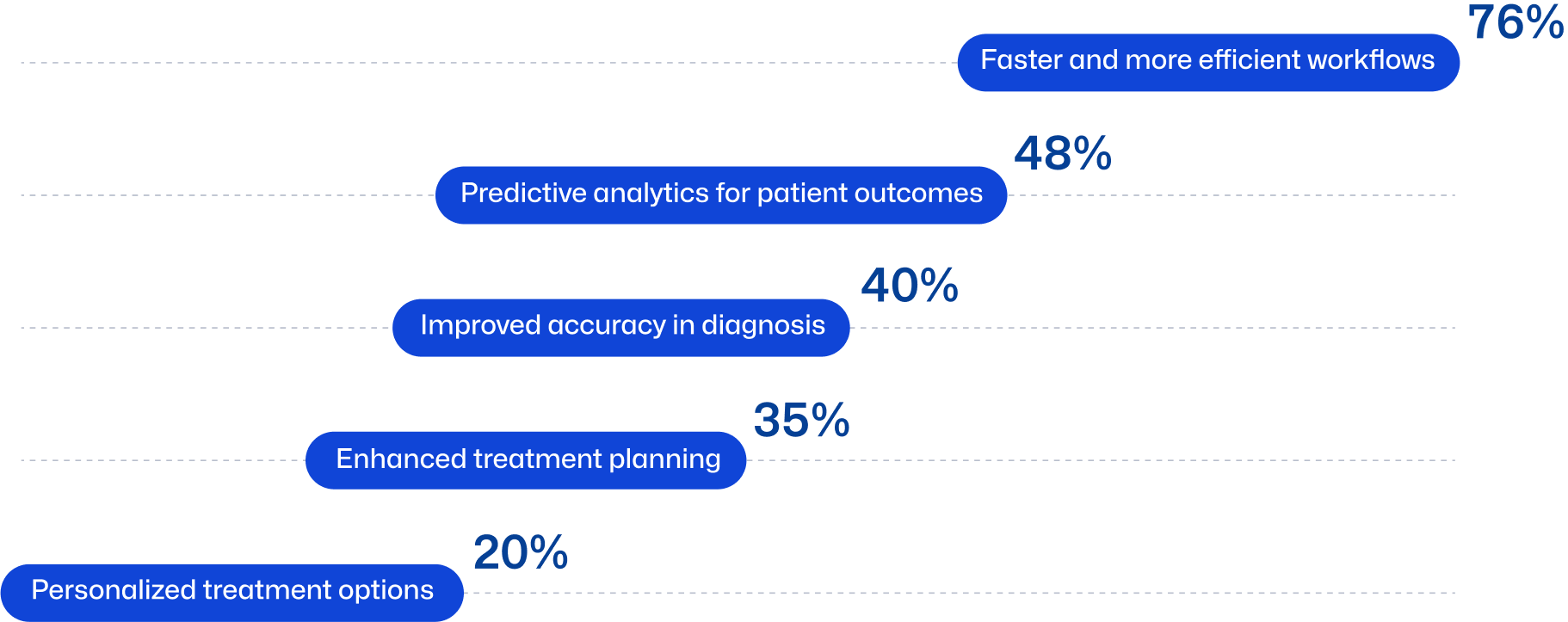
AI Concerns
in Dentistry
What concerns do you have regarding the use of AI in dentistry?
When asked what concerns they had most about AI in dentistry, a whopping 67% of expressed fears about the privacy and security of their patients' data, as well as the security of their own practice
Practitioners have expressed concerns about the potential breach of relevant laws, such as the Health Insurance Portability and Accountability Act (HIPAA), due to AI's heavy reliance on patient data. This worry stems from the potential compromise it could pose to their practice.
Here's a list of dentists' top five concerns concerning AI in the dental space.
-
67% Data privacy and security
-
67% Reliability and accuracy of AI systems
-
52% Ethical considerations
-
43% Cost of implementing AI technologies
-
33% Potential job displacement
Future of AI
in Dentistry
Complete AI integration into dentistry will take some time to achieve. This may lead many to wonder whether AI stands a chance in the industry's future.
of surveyed dentists agreed that some of the operational tasks in dental clinics could be performed by AI.
believe that AI could replace certain tasks currently performed by dentists.
believe that the advancements in AI could result in potential layoffs in the dental care industry in the next five years.
These statistics could explain why the majority haven’t incorporated AI into their practice. Many dentists fear that artificial intelligence will, in one way or another, threaten their livelihood. To better understand how dentists perceived the future of artificial intelligence, the survey asked the respondents three specific questions, as discussed below.
1/
How do you envision AI impacting the future of dentistry?
Here is what the surveyed dentists had to say.
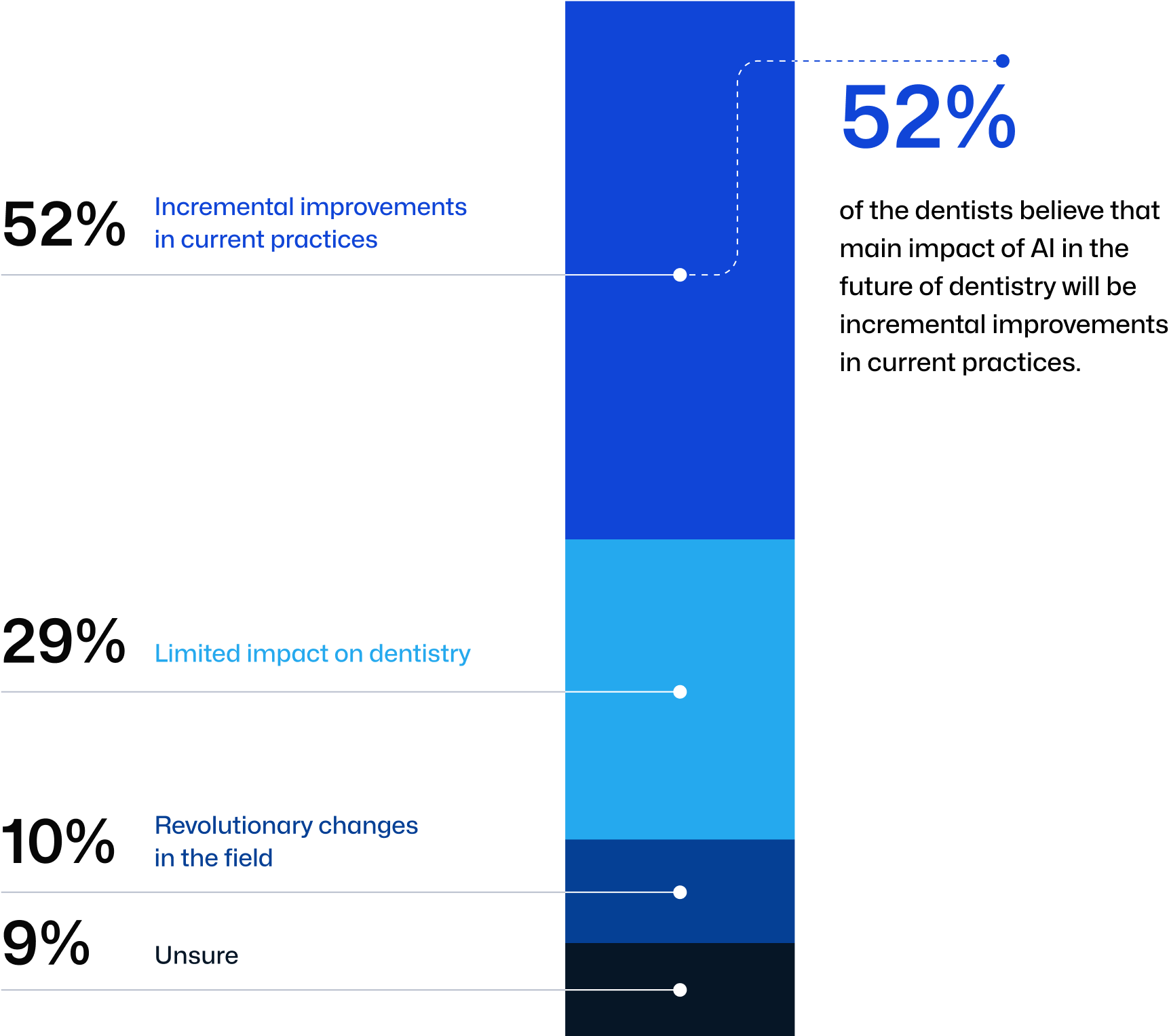
2/
Which areas of dentistry do you believe will benefit the most from advancements in AI?
Despite the concerns over AI taking over certain dentistry jobs, 52% of respondents believe AI will positively impact dentistry.
They specifically highlight that the main impact of AI in the future of dentistry will be incremental improvements in current practices. According to 62% of the surveyed dentists, treatment planning is the area that will benefit most from AI advancements in dentistry.
Here's a list of the areas dentists believe will benefit the most from advancements in AI.
3/
How likely are you to adopt additional AI technologies in your practice in the next five years?
When asked about the likelihood of adopting AI technologies into their practice, it appears that the majority of dentist are open to adopting additional AI technologies within the next five years.
A significant portion, 47%, expressed being somewhat likely to adopt these technologies. On the other hand, a relatively small percentage of practices, only 14%, indicated that they are somewhat unlikely to adopt AI technologies in the coming years.
It is interesting to note that none of the respondents perceived it as very unlikely to adopt AI technologies, indicating a general openness to exploring and incorporating AI advancements. Overall, the results suggest a positive outlook for the integration of AI technologies in the dental field in the near future.
- Very likely 10%
- Somewhat likely 47%
- Neutral 29%
- Somewhat unlikely 14%
- Very unlikely 0%
Patient Insights
Besides the perceptions held by dentists, the survey also questioned several patients to get their take on the adoption of artificial intelligence in the dental service sector.
This part of the survey focused on two sections: the participants' demographics and their perceptions.
Let's explore each section.

Demographic
Of the patients surveyed, 55% were female and 44% were male.
Only 1% did not identify as either male or female.
Female
Male
Others
In addition to gender distribution, the surveyed patients represented a range of household incomes. Here is a breakdown of the percentage distribution of household income among the interviewed patients.
Distribution of household income among the interviewed patients.

Patient Perception
of AI in Dentistry
Patients generally perceive the incorporation of artificial intelligence (AI) in dentistry with a mix of curiosity, excitement, and some concerns
Here are some common concerns regarding the use of AI in dentistry.
Lack of human interaction during treatment
Reliability and accuracy of AI systems
Potential increase in the cost of treatment
Privacy and security of personal information
Ethical considerations
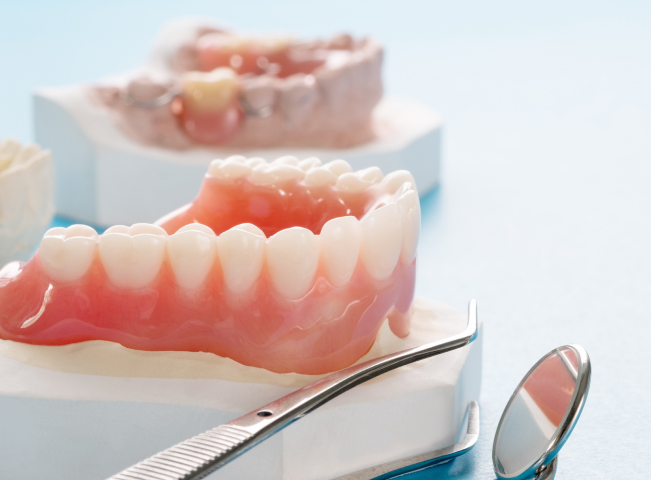
According to 72% of patients, "Lack of human interaction during treatment" is a major concern for integrating AI in dentistry.
While patients acknowledge the benefits of AI in dentistry, they also value the human touch, empathy, and personal interaction provided by dentists, aspects that AI cannot fully offer.
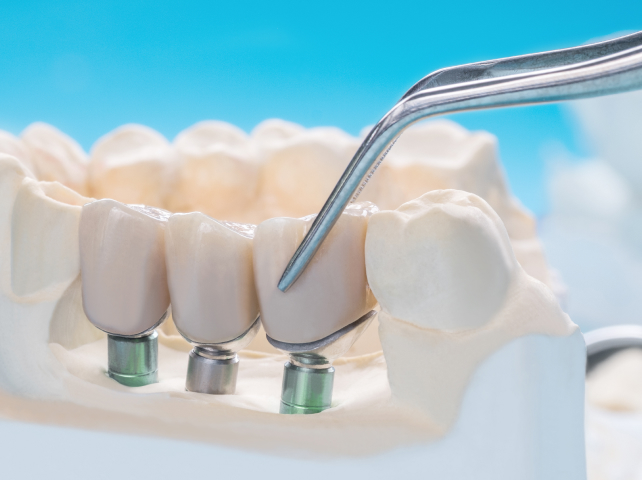
On the other hand 42% of the surveyed patients feel comfortable receiving AI-based dental treatment, while the majority remain neutral about this matter.
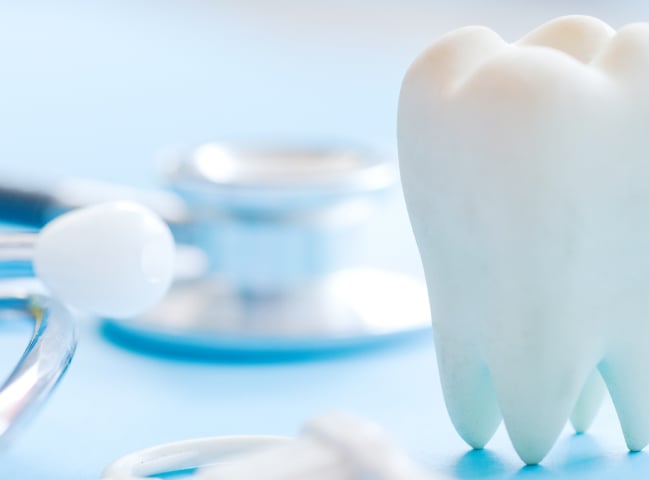
Similarly, the majority of patients (57%) remain skeptical about integrating AI into diagnosis, and only 10% of surveyed patients are willing to pay extra for dental treatment or diagnosis that incorporates AI technologies
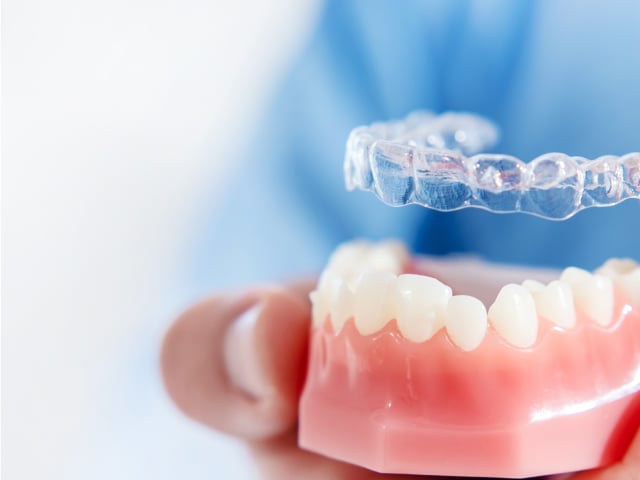
More interestingly, 68% of the patients believe in the potential benefits of AI applications, and 65% of the surveyed patients are open to receiving dental treatment or diagnosis incorporating AI in the future.
The future may be more promising for AI in dentistry.
The AI in Dentistry Survey sheds light on the remarkable progress and potential that AI holds for the future of dental care. It also indicates the perceptions held by dentists and patients on the subject.
According to the results obtained, 35% of dentists are applying AI to their practice, and the number is likely going to increase in the next five years.
Although the pace of adoption is rather slow, most practitioners agree that AI has its benefits, including faster and more efficient workflows, predictive analytics for patient outcomes, improved accuracy in diagnosis, enhanced treatment planning, and personalized treatment options.
From the patients’ point of view, the incorporation of AI in dentistry is promising. However, there are a few concerns about the lack of human interaction during AI-based treatment. Additionally, most patients are concerned about the cost implications that may result from AI-aided dental procedures. Besides these, many patients believe in the potential benefits of artificial intelligence.
EXPERT OPINION

Brendon Macdonald
Digital Smile Design, CEO
Overall, generative AI has the potential to transform the dental industry by improving the accuracy and efficiency of diagnosis and treatment planning, streamlining care, and automating routine tasks. However, there are still limitations to the widespread application of AI in dentistry, and more research and development are needed to improve the accuracy and reliability of AI algorithms. AI cannot replace dental professionals; the solutions & systems are far from being able to do so. AI should be viewed as a complementary asset to assist dental professionals in their work
Fair Use Statement
Please feel free to share our findings with anyone you know who might benefit from them. Our only request is that you include a link back to this page so that readers can access all relevant information and our contributors can be properly credited.

